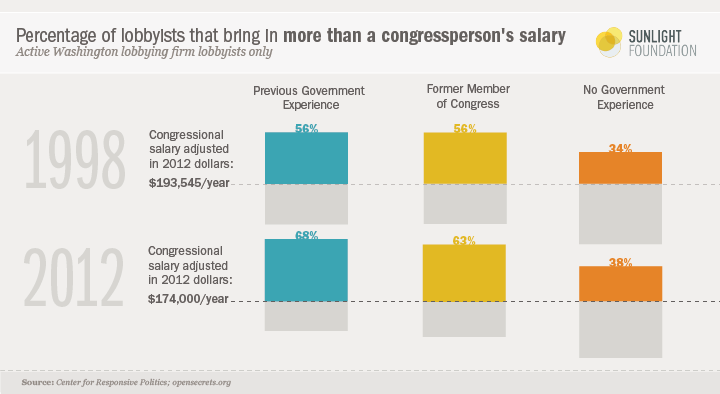Vox/Polyarchy
Paying Congress’s interns a living wage is a good idea. Paying professional staff one is even better.
With a median household income of about $95,000, Washington, DC metro area is the third-priciest place to live in the US. If we assume 48 work weeks a year, the median junior staffer in Congress earns between $10.25 and $12.00 an hour.
Sunlight Foundation
Is the Ex-Im bank really doomed? Not likely, if you look at historical lobbying efforts
A Sunlight Foundation analysis of the 20 organizations that have lobbied the most on the Export-Import bank since 2008.
Sunlight foundation
K Street pays top dollar for revolving door talent
It is a widely accepted truism in Washington that the place to get rich is on “K Street” — that metonymic shorthand for the Washington lobbying business. But how rich?
The Atlantic
Why Representative Democracies Can't Write Off Transparency
Interest groups from the NRA to the Sierra Club show the power of information to motivate citizens.
The Atlantic
It's Not All About You: What Privacy Advocates Don't Get About Data Tracking on the Web
People condemn targeted advertising for its "creepiness" but the real issue is that we are giving private companies more power.
Legbranch
Legislative staff are spending an increasing amount of time on constituent services
Results from our 2017 Congressional Capacity Survey (CCS) show that despite the large share of staff resources allocated explicitly to dealing with constituent response, constituent demands frequently encroach on the activities of staffers with other responsibilities.
Sunlight Foundation
Why Congress might be more productive – and less partisan – than you think
Looking at bill introductions, their subject matters and their co-sponsorship patterns, a story emerges from the 2013 Congress.
The Daily Dot
Who’s putting the most money against net neutrality?
Going back to 2005 (when the phrase “net neutrality” first shows up in lobbying disclosure reports), the principle’s biggest opponents (Verizon, AT&T, Comcast and their allies) have lobbied against net neutrality about three times as hard as the biggest proponents of neutrality (Level 3, Google, Microsoft and their allies).
Sunlight Foundation
Public universities, for-profit colleges seek higher stake in student loans
A Sunlight Foundation analysis of student loan lobbying data suggests that major players in the political process are interested in them, that´s why they have been getting these unsecured loans.
The Atlantic
You Can't Use Twitter to Predict Election Results
Twitter may provide useful clues for detecting a spike in influenza, but its users are too different from the population at large for counting votes before they're cast.
The Atlantic
Homeland Security's 'Pre-Crime' Screening Will Never Work
Chances are, you'll snag the wrong people, and when you do, how can you tell? How do you clear suspects of crimes that haven't happened?
The Atlantic
Everything You Wanted to Know About Data Mining but Were Afraid to Ask
A guide to what data mining is, how it works, and why it's important.
The atlantic
When You Can't See Your Audience, but You Can See Your Social Life
Computer-mediated communication often makes visible and explicit many aspects of social interaction that are normally invisible or implicit.





